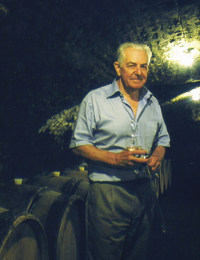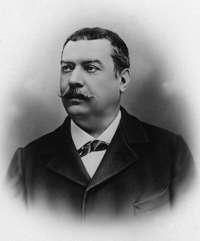
Winegrower Burgundy

A wonderful family saga in the heart
of a prestigious winegrowing area Discreetly protected by the anonymity of the domain’s entrance, on the Place du Murget in Meursault, Albert Grivault’s heirs continue their ancestor’s venture. They are located in the heart of the winegrowing area in Meursault.
Their address alone is symbolic, since the Place du Murget bears a name directly linked to vine growing.
In Burgundy, the word ‘murget’ means a pile of stones formed on the edge of vineyard plots by winegrowers who try to adapt vine growing to the presence of numerous stones and rocks, which are indeed factors that contribute to the characteristic features of these wines. Stone quarries have always existed in the Burgundy hillsides, because rock is practically omnipresent. Stone was extracted in ancient times and still is today. Men were winegrowers or stonecutters. At the age of 19, after the death of his father, Albert Grivault decided to devote his life to winemaking and distillation. In 1875, phylloxera had already established its disastrous consequences in the Laguedoc area, but had yet not reached Burgundy. In 1879, the Marquess de la Roche, well-known aristocrat and estate owner in Meursault, died without leaving any direct heirs. So the prestigious “climat”(a small plot of land where vines are grown) in Meursault named Le Clos des Perrières, which has sometimes been compared to Montrachet, was put on sale and Albert Grivault bought it. It was a stroke of genius he paid a high price for, but it brought excellence to his domain.
Le Clos des Perrières is a real vineyard that forms a piece of land stretching across approximately one hectare in an appellation whose fine reputation had been established many years before. However, in 1879 the vile phylloxera insect continued its unrelenting march northwards and appeared in Burgundy, before contaminating the rest of Europe. Had Albert Grivault made the right decision? Was it a good investment? But these doubts certainly did not trouble Albert Grivault, an intelligent, enterprising young man who had observed that the Languedoc area, affected 10 years previously, had retaliated to the insect’s attacks by using grafts and hybrids. Nevertheless, as the winegrowing area of southern France gradually became re-established, it was to come up against competition from substitute wines and new vineyards in Algeria. Excess production would hit this newly re-planted winegrowing area. Bolstered by his experience as a distiller, Albert Grivault settled in Béziers, where he began producing “Fine Béziers”, thus reviving the tradition of Languedoc’s reputed brandy liqueurs of the previous century. His business was a success and he distinguished himself by his talent for tasting both in Burgundy and Béziers. He expanded his domain in Burgundy to a total of 15 hectares, including 1 hectare of Clos de Vougeot, which was subsequently sold in 1931. In an impulse of generosity, he donated a Meursault Charmes vine to the Hospices de Beaune, for which he received gratitude and recognition from the hospital order and ensured his lasting memory.
It goes without saying that such a lineage was going to be difficult for his heirs, who are now Michel Bardet, his sisters and his children.
Excellence, culture and attentive care for an entire family
Michel Bardet, an electronics engineer and his sister Marguerite Bardet, who has a university aggregation, both work at the domain. They have dedicated their talents to the fine wines whose reputation they sustain. Modest, but immersed in culture, especially that of Burgundy, they apply scientific stringency and high university standards to the elaboration of their wines and the management of their domain. It is a pleasure to hear Michel Bardet talk about the care lavished upon his wines.
Robert Tinlot: You produce wines in a limited area in Burgundy, whereas most winegrowers in this region own a large number of appellations, ranging from the Côte de Nuits to the Côte de Beaune, and often as far as the Côte Chalonnaise.
Michel Bardet: We own six hectares of vines, but they represent six different AOCs: five in Meursault and one in Pommard : Le Clos Blanc, which is a red wine. The story behind this name is quite an anecdote; I’ll have to recount it one day! In Meursault, we have Burgundy and Meursault in the centre of the village, Meursault Perrières 1st Growth and finally the well-known Clos de Perrières, monopoly of the domain and our family treasure. These six appellations are the result of delimitations that were carefully considered. Burgundy is the world’s most celebrated place for the notion of appellations of origin being based on the terroir, in the most exact sense of the word. Small named places (that we call “climats” here) must be respected. In this region we take great care not to mix grapes and ensure that the origins of each “climat” are protected.
These days the trend is for winemaking to be short in order to make wines that can be consumed rapidly. What is the policy at your domain?
At our domain, wines are made to be laying-down wines with a moderate use of barrels over a period of five years. Le Clos des Perrières is ready to drink after ten years; Les Perrières 1st Growth after eight years, Meursault four to five years and the Burgundy two years. For our Pommard, it is at its best after eight years.
Many leading domains refuse to enter the competitive world of contests. What about the Domaine Albert Grivault?
It is important to remain modest and attentive to judge’s assessments and that is why I readily present my wines for leading wine competitions. I am delighted to have had numerous successes. I have regularly won gold medals, been voted as favourite wine and have received other flattering write-ups from leading tasters. My international customers are very aware of these awards. Therefore, I sell 25% of our wines to Japan and 15% to the United States. We also sell to the United Kingdom, Belgium and the Netherlands. In all these countries our clientele is comprised of demanding connoisseurs and if these customers remain loyal it is because the quality of our Meursault and Pommard wines meets their high expectations.
Robert Tinlot
Domaine Albert Grivault
7, Place du Murger
21190 Meursault
Tél. : 03 80 21 23 12
Fax : 03 80 21 24 70

Michel Bardet, petit-fils
d’Albert Grivault




